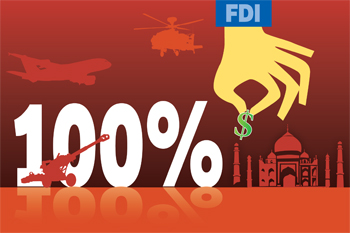Transformational and Radical Reforms by Modi Government: 100 per cent FDI in defence, aviation

The government under the leadership of Prime Minister, Narendra Modi today radically liberalised the foreign direct investment (FDI) regime with the objective of providing major impetus to employment and job creation. With this, India now is the most open economy in the world for FDI as most sectors come under automatic approval route.
After the announcement of the policy, the Prime Minister tweeted that India is rated as Number 1 FDI investment destination by several international agencies. India, he tweeted, recorded highest ever FDI inflows at US$55.46 billion in financial 2015-16. He also tweeted that 'amendments in FDI policy is to promote ease of doing business' and 'liberalisation of FDI regime now more inflows to contribute to growth of investment, incomes and employment.'
The major policy decision was taken at a high-level meeting chaired by Prime Minister Narendra Modi today. This is the second major reform after the last radical changes announced in November 2015. Now most of the sectors would be under automatic approval route, except a small negative list.
In last two years, Government has brought major FDI policy reforms in a number of sectors viz. Defence, Construction Development, Insurance, Pension Sector, Broadcasting Sector, Tea, Coffee, Rubber, Cardamom, Palm Oil Tree and Olive Oil Tree Plantations, Single Brand Retail Trading, Manufacturing Sector, Limited Liability Partnerships, Civil Aviation, Credit Information Companies, Satellites- establishment/operation and Asset Reconstruction Companies. Measures undertaken by the Government have resulted in increased FDI inflows at US$ 55.46 billion in financial year 2015-16, as against US$ 36.04 billion during the financial year 2013-14. This is the highest ever FDI inflow for a particular financial year. However, it is felt that the country has potential to attract far more foreign investment which can be achieved by further liberalizing and simplifying the FDI regime.
Foreign Investment in Defence Sector up to 100%
Presently FDI regime permits 49 per cent FDI participation in the equity of a company under automatic route. And FDI above 49 per cent is permitted through Government approval on case to case basis, wherever it is likely to result in access to modern and 'state-of-art' technology in the country. In this regard, the following changes have inter-alia been brought in the FDI policy on this sector:
- Foreign investment beyond 49 per cent has now been permitted through government approval route, in cases resulting in access to modern technology in the country or for other reasons to be recorded. The condition of access to 'state-of-art' technology in the country has been done away with.
- FDI limit for defence sector has also been made applicable to Manufacturing of Small Arms and Ammunitions covered under Arms Act 1959.
FDI in Civil Aviation
- The extant FDI policy on Airports permits 100 per cent FDI under automatic route in Greenfield Projects and 74 per cent FDI in Brownfield Projects under automatic route. FDI beyond 74 per cent for Brownfield Projects is under government route.
- With a view to aid in modernization of the existing airports to establish a high standard and help ease the pressure on the existing airports, it has been decided to permit 100 per cent FDI under automatic route in Brownfield Airport projects.
- As per the present FDI policy, foreign investment up to 49 per cent is allowed under automatic route in Scheduled Air Transport Service/ Domestic Scheduled Passenger Airline and regional Air Transport Service. It has now been decided to raise this limit to 100 per cent, with FDI up to 49 per cent permitted under automatic route and FDI beyond 49 per cent through Government approval. For NRIs, 100 per cent FDI will continue to be allowed under automatic route. However, foreign airlines would continue to be allowed to invest in capital of Indian companies operating scheduled and non-scheduled air-transport services up to the limit of 49 per cent of their paid up capital and subject to the laid down conditions in the existing policy.
Addressing a news conference following the announcement, the Minister of Commerce, Nirmala Sitharaman said that the guiding principle for the radical changes in FDI is 'ease of doing business' and that 'this is where it starts'. In the aviation sector, she said that the National Civil Aviation Policy (NCAP) announced last week was a precursor to the FDI policy. The FDI policy is kept in line with NCAP and they will go simultaneously. The NCAP, she said, essentially opens up Indian skies and makes flying affordable; brings in parity with Indian and foreign players. We are creating an enabling environment for infusion of capital. "We are making this policy for more investments to come, not for foreign airlines."
Reacting to the policy, AirAsia chief Tony Fernandes has said it is a very progressive step and appreciated the government of India's efforts of bringing investments into India. With regards to the company's plans in India, he said the company would soon be deciding on the expansion plans, now with the NCAP and FDI policies are in place.





